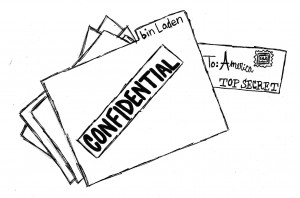Americans must respect military privacy
Just when everyone thought they had gotten a glimpse into what really happened during the military operation that killed infamous al-Qaida leader Osama bin Laden, another account comes out contradicting it.
This additional account arrived last week from a member of SEAL Team 6, the military unit that executed the May 2011 raid on bin Laden’s compound in Pakistan. The continuing barrage of conflicting information from individuals who are meant to keep such information secret reflects the harm that leaking classified information could cause.
The most recent account, released in response to an Esquire cover letter that told the tale of a man identified only as “The Shooter,” rejects the Esquire story’s description of how the man killed bin Laden as “complete B-S.” The Esquire article also happens to contradict the information in the controversial book No Easy Day, released by SEAL Team 6 member Matt Bissonnette, while yet another narrative is given in the film Zero Dark Thirty.
The confusion regarding what actually happened that night in Abbottabad shouldn’t be surprising, especially given that the operation was supposed to be a top-secret government operation with no detailed information given to the public.
The problem is that Americans expect to be told absolutely everything about everything — and the perpetual quest for controversial information has invaded a sphere that should be kept separate of public prying. Though freedom of information and government transparency are very important in domestic issues, releasing classified information on national security operations has the capacity to bring more harm than good.
Aside from what has thus far proved to be fruitless squabbling over the minor details of one of the most hyped military operations in American history, the larger question should be whether those on the Special Operations team that killed bin Laden acted unethically in sharing the operational details that they promised to protect.
Bissonnette faced praise and criticism when he published his account of the operation under the pseudonym Mark Owen. This publication resulted in threats from the Pentagon that they would take legal action against Bissonnette for sharing classified information. According to a letter to Bissonnette and the publishing company behind his book, Bissonnette violated a non-disclosure agreement he signed while on active duty in 2007.
The point of keeping certain information classified is not just so the government can avoid being held accountable for its intelligence and military actions, as some of Bissonnette’s supporters might think. Instead, it is necessary for maintaining operational security. The purpose of Operation Security is to ensure that military and intelligence operations undertaken to protect national security are untainted by the release of information that could be used against the U.S.
It is thus unacceptable and dangerous for people, such as Bissonnette, to share such information with the public having agreed to protect the United States’ classified information.
In a message to the members of a SEAL unit that he commands, Head of the Naval Special Warfare Command Rear Adm. Sean Pybus expressed his disappointment over such disclosures of classified information: “We do NOT advertise the nature of our work, NOR do we seek recognition for our actions.”
Pybus’ sentiments should be common among all those who work in the interest of national security. The public’s desire for information on the operation that killed the most hated man in America is justifiable, but just because it is there does not mean that government operatives should give in to public pressure and the potential for fame and recognition.
The job of people, such as Bissonnette and his fellow SEALs, is not to sate the public’s thirst for classified details, but to do whatever they can to protect the homeland from enemies both foreign and domestic. The continued argument over the SEAL Team 6 operation against bin Laden indicates that these people are not carrying out their duties, which in the end only makes America more vulnerable to its enemies.
Sarah Cueva is a junior majoring in Middle East studies and political science. Her column “Homeland” runs Wednesdays.

